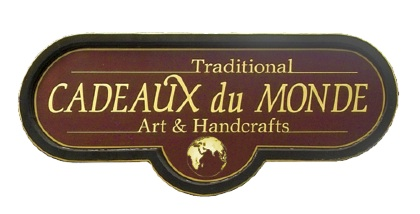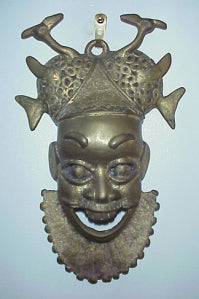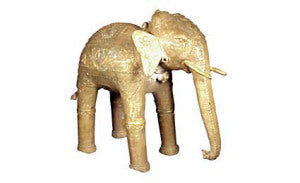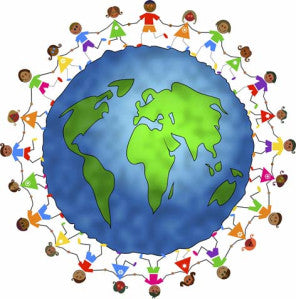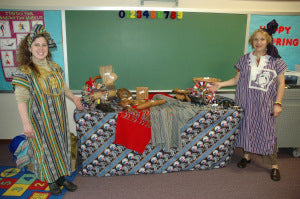CADEAUX du MONDE's Blog
Exploring Lost Wax Casting March 23, 2011 16:54
Lost wax casting is one of the oldest types of casting. It is a tradition that dates back over 4000 years and its current practitioners are found in many tribal cultures around the world. Before we explore some of those varied traditions, we need to define the process.
In principle, "lost wax" casting means that first a wax model of the desired piece is made. This piece is then covered with slip, usually made from finely pulverized charcoal and clay which is then covered with a mud/dung mixture to form a mold. After drying, the mold is heated, causing the wax to melt and molten metal is poured into the mold replacing the wax. After cooling, the mud/dung mold is broken away to reveal the metal replica of the original wax model. As both wax model and clay mold are destroyed, each piece is unique. Solid casting and hollow casting can be done using this process. In addition, because the original is fashioned using wax, there is an extraordinary level of fine detail that can be achieved.
Brass and bronze "lost wax" casting are part of a vibrant folk art tradition in West Africa, India, Thailand and the Philippines with ancient roots that continue in those communities up to the present day. In India, this type of metal casting is known as Dhokra and in West Africa--"cire perdue".
Brass is an alloy formed from copper and zinc and bronze is an alloy formed from copper and bronze. In the past, the brass and bronze alloys were formed from smelting copper, zinc and tin. Today, the majority of "lost wax" brass and bronze castings are handcrafted using recycled metal, often old plumbing parts or other industrial pieces which lends an added 21st century "green" dimension to these unique pieces.
The Camerounian Face Mask pictured above was handcrafted in the Northwest Province of Cameroun, West Africa and is an example of a solid casting. Typical of the "lost wax" brass work in that region, the mask is highly polished in parts as well as blackened in other areas to add dimension to the overall design and effect of the piece.
The highly detailed work on the Indian Dhokra Elephant pictured above was achieved using the technique of constructing the wax original from finely rolled wax threads. This dynamic piece, an example of hollow casting, was cast in two parts--the head and the body--which were then bolted together to form the elephant sculpture.
T'boli craftsmen in the Philippines refer to "lost wax" casting as a process that unites earth, water and fire. To see and explore more examples of the varied "lost wax" casting traditions from the developing world, stop by our gallery, CADEAUX du MONDE, 26 Mary Street, Newport, RI or check us out on the web at www.cadeauxdumonde.com.
Bring the World Into Your Classroom in 5 Easy Steps March 5, 2011 18:11
When my partners and I opened CADEAUX du MONDE, our green, fair trade, international folk art gallery, we decided to also include an educational component--teaching multicultural workshops and giving development education lectures on fair trade and socially responsible travel and tourism. Luckily for our vision, this coincided with a push in our area and around the US to have multicultural education included as part of the regular curriculum. Twenty-four years later, the world is even more interconnected and it is more important than ever for us all to embrace and celebrate our similarities as well as our differences. We truly have so much to learn from each other!
We have been presenting our participatory multicultural workshops focusing on different regions in Africa, the Indian subcontinent and Central America in both public and private schools in Rhode Island and Southeastern Massachusetts since 1987. Based on the overwhelmingly positive response we have received over the years, I think that we have a winning formula on how to engage children from pre-school through high school. Every educator knows that engaging students is a big part of getting them to learn and retain what they learn.
The following are our core suggestions to educators on how to "Bring the World Into Your Classroom in 5 Easy Steps".
1. Schedule a workshop--choose a country or region to cover.
a. Look at the calendar and coordinate with international or US holidays or events (thematic approach) i.e. February "Black History Month"--Africa, Chinese New Year--China, Pan American Day (April 14)--Latin America, UN Days, Independence Days (i.e. September 15 is Independence Day in Guatemala, El Salvador, Costa Rica, Honduras and Nicaragua), Mother's Days (May 8--USA, Germany and Guatemala), Children's Days and Labor Days (May 1--Mexico).
2. Use your resources.
a. Go to the library to do research (Adult as well as Children's Section) and look for books on Language, Stories, Songs, Games, Tapes or Records, Recipes, etc.
b. Try anthologies and international collections.
c. Maintain accuracy of information presented.
d. Use parents (Find out who has an international/ethnic background or who is well-traveled through surveys and questionnaires. They are a resource for information as well as artifacts and clothes.)
3. Assemble a culture kit (either temporary or permanent) to help you present the workshop. Include books, CD's, fabric, jewelry, instruments, stamps, coins, photos, etc.
4. Plan your workshop. Outline what you plan to present and put it into a timetable.
Sample West Africa Workshop Outline
a. Geographic Literacy illustrated with map and culture kit items (10-15 min.)
b. Language--Sango Conversation (10 min.)
c. Story--"How the Animals Got Their Tails" (10-15 min.)
d. Games--Stomp Game and String Game (10-15 min.)
e. Dancing--Beguine and Makossa (10-15 min.)
f. Refreshments--Fresh tropical fruit such as bananas, pineapples, oranges, mangoes, passion fruit and coconuts can be served alone or with plain yoghurt sweetened with sugar. In addition, fried plantain are a common West African snack.
5. Present your workshop.
If putting the aforementioned workshop together inhouse all seems too complicated, you can bring in our staff to do all of the above for your class (provided you're located in New England). The following is our CADEAUX du MONDE Multicultural Workshop Flyer:
If you’re looking for an exciting, stimulating and, most important, educational multidisciplinary multicultural program to augment you curriculum, look no further.
Let the staff of CADEAUX du MONDE bring the world to your classroom
Our staff is available to present our participatory one hour workshops featuring these areas of the world: West Africa, East Africa, Southern Africa, the Indian Subcontinent and Central America Each of these multicultural hands-on programs is tailored to the age and ability of your students and to fit into your curriculum. All of your students will be dressed in the authentic clothing of the particular region of the world that they are studying. Cultural differences and similarities will be discussed as the students examine everyday objects. They’ll learn simple phrases and sentences in the language of the region and end this action packed hour by learning a dance or playing a game.
These very popular workshops have been presented in both public and private schools in Rhode Island and Southeastern Massachusetts since 1987 to classes ranging from pre-school through seniors in high school. Institutions include: Rogers High School, East Greenwich Public Schools, the Swinburne School, Learning Connection, Newport Public Library, St. Michael’s School, Nashoba Brook Country Day School, Sheffield School, Underwood School, Sullivan School, Lucy’s Hearth, Martin Luther King Center Day Care Program, Beginnings, Narragansett Pier School, Community Prep School, Countryside Children’s Center, McCauley Village, Newport County Head Start, Portsmouth School System and John Greene Elementary School.
We have conducted teacher training sessions for the New Enlgand Educational Media Association Conference, the Early Childhood Learning Conference and the South County Montessori School. In addition, we have given development education lectures on fair trade and socially responsible travel and tourism on undergraduate and graduate university levels at Salve Regina University and Johnson & Wales University.
Workshop Format
One hour; limited to 25 students. Each session includes: sections on geographic literacy, object literacy illustrated with photos, artifacts, instruments, clothing and jewelry, basic language instruction, stories*, games*, and music and dance from the region.
*These sections can be eliminated if you have time constraints or wish to have more emphasis on another section.
We encourage you to coordinate a lunch or snack with your parents’ group so that your students will have a complete multicultural experience of the area of the world that they are studying. We can provide simple recipes using authentic, but readily available ingredients.
Costs
*WORKSHOP: $95.00 per hour
*TEACHER TRAINING: $190.00 per 2 hour session
*A travel fee is added for locations outside Newport County
Multicultural Teaching Staff
Katie Dyer: For 24 years, a self-employed managing partner of CADEAUX du MONDE, an eclectic, green, fair trade, international folk art gallery. Arranged and conducted numerous trade missions abroad. University of Pennsylvania graduate. Returned Peace Corps volunteer. Fluent in French and Sango. High school math professor, multicultural education teacher and lecturer, small business consultant.
To Schedule a Workshop or Teacher Training Session, contact:
CADEAUX du MONDE, 26 Mary Street, Newport, Rhode Island, (401)935-0550, info@cadeauxdumonde.com
